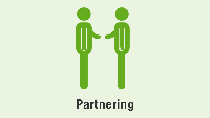Sustainability
BASF joins multinational companies to set action agenda for the vision that all people live well within planetary boundaries
March 25, 2021
As a member to The World Business Council for Sustainable Development (WBCSD), BASF together with more than 40 multinational companies lay out "Vision 2050: Time to Transform", with nine pathways to action across industries to ensure a more sustainable and prosperous future.

By 2050, 9+ billion people will live on planet earth. All of them need food, shelter and many other things for a good life. How can this be provided within the planet’s boundaries? The members of the World Business Council for Sustainable Development (WBCSD), a CEO-led organization of over 200 leading companies, have developed “Vision 2050: Time to Transform”, an agenda to shape and drive the transformation towards a regenerative future.
The WBCSD report reflects three critical challenges: the climate emergency, nature loss and mounting inequality. It calls on business leaders to act towards these challenges and drive transformative change in their sustainability planning and business strategies. BASF is taking action to address these challenges, e.g. with its climate target, its forest protection position and the palm commitment, or societal engagement.
To move beyond business-as-usual into the accelerated transformations necessary, Vision 2050 calls for three mindset shifts: reinventing capitalism that rewards true value creation; focusing on building long-term resilience; and taking a regenerative approach beyond doing no harm. “We need to take ownership and create transparency of our impact. We must incentivize financial markets so that investments drive values on all levels. For this, we need to think beyond the current framework. It is about reinventing our way of doing business,” says Saori Dubourg, WBCSD Council Member and Member of BASF’s Board of Executive Directors.
Vision 2050: Time to Transform maps how systems transform and lays out a new framework to guide business action in the decade ahead. At the heart of this framework are nine transformation pathways – actionable routes for companies to take – covering the areas of business activity that are essential to society: energy; transportation and mobility; living spaces; products and materials; financial product and services; connectivity; health and wellbeing; water and sanitation; and food.
The vision and transformation pathways are aligned with the UN Sustainable Development Goals (SDGs) and the targets of the Paris Agreement. Each of the nine transformation pathways contains ten action areas for the decade ahead, designed to help companies drive transformative change in their strategies, business operations and impact on society.
While business can take a leading role according to WBCSD, it must work on and design system transformations, together with scientists, policy makers, financiers and investors, innovators and consumers. Only collaboration at unprecedented levels will create the impact and speed needed to achieve all people living well within planetary boundaries by 2050.
